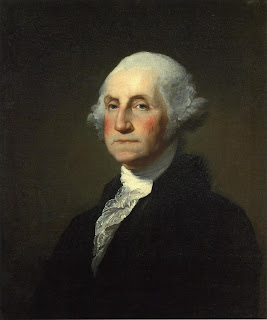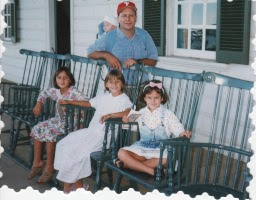Mount Vernon, VA. Visited September 1997
 |
| Gilbert Stuart's Portrait |
In honor of President’s Month, this is a post on our first president, born February 22, 1732; 280 years ago this month. Its impossible to compress the life and impact of George Washington into a blog. But here’s a shot. First, the legends. Wooden teeth? Never had them, though he was down to one real tooth by middle age. He never tossed a silver dollar over the Potomac. And by now we know that he didn’t chop down his father’s cherry tree, although this interview by Kermit the Frog does seem to support the story.
 |
| The Blogger and his lovely wife at the Washington Monument, New Years Day 2005 |
George Washington was born into the landed gentry of the Virginia Colony. He married Martha Custis, a widow with two children, when they were both twenty-seven. The couple raised both of Martha’s children from her previous marriage until they prematurely died and then raised grandchildren. They never had children of their own. Washington's initial vocation was as a surveyor but he joined the Colonial Army (British) in the French and Indian War, rising into a commanding rank and earning important battle experience. He was a natural leader and gifted horseman with a strong code of honor that earned him broad respect throughout his life. It also didn’t hurt that at 6’2” he towered over most men of his age. These qualities made him the obvious choice to command the Continental Army in the War for Independence beginning in 1775.
'Washington Crossing the Delaware' by Emanuel Leutze (1851) is to me one the great military paintings of all time |
In addition to natural leadership qualities Washington’s strengths as a commander included a humble confidence that allowed him to work effectively in a highly charged political environment, and a tactical flexibility that allowed him to learn from mistakes and adjust to battlefield realities.(Contrary to recent commercials Washington did not rout the British in battle driving a Dodge Charger.) He combined a rare ability to build coalition but also was a decisive leader. Washington's genius was not in battle management; he actually lost more battles than he won. But his ability to organize, train and inspire a poorly equipped rag tag volunteer army against superior numbers and quality of troops was extraordinary. The battles Washington did win were highly symbolic and seemed to come at times when the Colonies most needed them. His victory at Yorktown in 1781 which ended the war was a mix of tactical brilliance and the providential arrival of the French Fleet, sealing off any help or retreat from the sea for the British Army.
 |
| Rushmore George |
George Washington retired from public office and returned to his plantation in Mount Vernon, VA to live the life of a gentleman planter. Washington owned as many as 317 slaves but clearly agonized over the morality of slavery throughout his life. In his will he made provision to free all of his slaves following his death. Just two years after leaving office and while still in fine health, George caught a throat infection after riding through his estate in winter weather. The infection was unresponsive to the barbaric treatments of the day. His condition deteriorated and within little over two days he had passed away. While there was considerable interest in burying him in the nation’s capitol, the nation yielded to the family wishes and he was buried at Mount Vernon. His current burial tomb is near the original site of his grave on the grounds of his estate.
| George Washington's Tomb at Mount Vernon |
| Plaque inside Washington's Tomb quoting John 11:25-26 |
In the famous eulogy by Henry ‘Light Horse Harry’ Lee (father of Robert E. Lee), Washington is remembered as,
First in war—first in peace—and first in the hearts of his countrymen, he was second to none in the humble and enduring scenes of private life; pious, just, humane, temperate, and sincere; uniform, dignified, and commanding, his example was as edifying to all around him as were the effects of that example lasting. To his equals he was condescending, to his inferiors kind, and to the dear object of his affections exemplarily tender; correct throughout, vice shuddered in his presence, and virtue always felt his fostering hand; the purity of his private character gave effulgence to his public virtues. His last scene comported with the whole tenor of his life—although in extreme pain, not a sigh, not a groan escaped him; and with undisturbed serenity he closed his well-spent life. Such was the man America has lost—such was the man for whom our nation mourns.
 |
| There are a gazillion Washington statues. This one at the George Washington Memorial Gardens in Paramus, NJ is is interesting |
Remarkably this romantic portrayal of Washington is probably not far the true character of the man known as ‘Father of our Country’. As with all the Founding Fathers there is debate over the nature of Washington’s religious faith. He was tolerant of all faiths in the public square but rarely wrote about his personal beliefs. Yet there are numerous first hand witnesses to a pattern of daily bible reading and prayer, and there is little evidence of the embrace of the philosophical deism that was openly commented on by other Founding Fathers. It might be best to see Washington as a practical Christian of his day, with a moral nature shaped by Biblical principles and an abiding confidence in God, but not of the evangelical mindset that had begun to differentiate Gospel belief from traditional church fidelity. There may be some indication of the state of his soul at the end of his life in his last words: 'Tis Well’.
 |
| With the kids on the porch of George's crib at Mount Vernon |
I visited Mount Vernon with my family on our way south to a vacation at the North Carolina Shore. It is well worth the time to go there if you are ever in the DC area.


